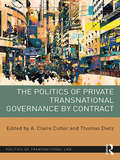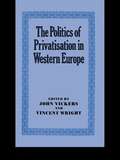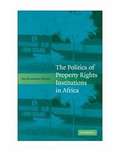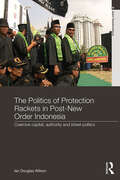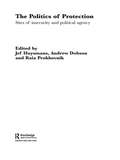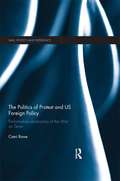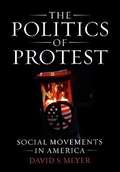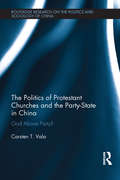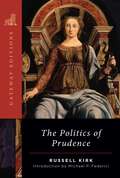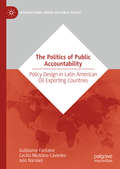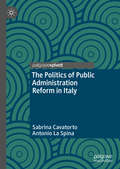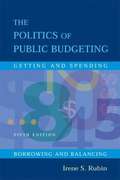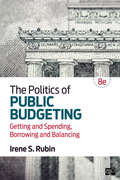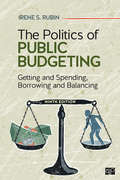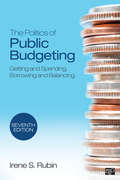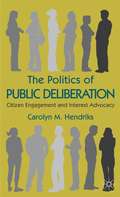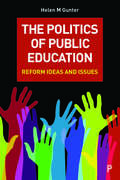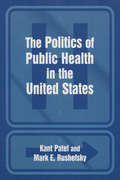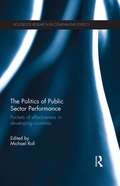- Table View
- List View
The Politics of Prisoner Abuse: The United States and Enemy Prisoners After 9/11
by David P. ForsytheWhen states are threatened by war and terrorism, can we really expect them to abide by human rights and humanitarian law? David P. Forsythe's bold analysis of US policies towards terror suspects after 9/11 addresses this issue directly. Covering moral, political, and legal aspects, he examines the abuse of enemy detainees at the hands of the United States. At the center of the debate is the Bush Administration, which Forsythe argues displayed disdain for international law, in contrast to the general public's support for humanitarian affairs. Forsythe explores the similarities and differences between Presidents Obama and Bush on the question of prisoner treatment in an age of terrorism and asks how the Administration should proceed. The book traces the Pentagon's and CIA's records in mistreating prisoners, providing an account which will be of interest to all those who value human rights and humanitarian law.
The Politics of Private Security
by Adam WhiteThis is the first in-depth conceptual and empirical analysis of the political issues, processes and themes associated with private security provision and its growth in the postwar era, examining why private security has become so prominent, what its relationship to the state is and how it can be controlled.
The Politics of Private Transnational Governance by Contract (Politics of Transnational Law)
by A. Claire Cutler Thomas DietzThis edited volume provides critical reflections on the interplay between politics and law in an increasingly transnationalized global political economy. It focuses specifically on the emergence and operation of new forms of governance that are developing through a variety of transnational contractual practices, institutions, and laws in multiple sectors and areas of economic activity. Interdisciplinary in nature, the volume includes contributions from law, political science, sociology, and international politics, with the focus on the political foundations of transnational contract being both original and path-breaking. Placing power at the center of the analysis, the volume reveals the heterogeneous landscape of contemporary law-making and the different kinds of politics giving rise to this form of global ordering. As the contributors note, this new form of governance requires a different type of political theory and legal theory, with the volume advancing understanding of the analytical, theoretical and normative dimensions of private transnational governance by contract, making a valuable contribution to new theory in law and politics. It will be of great interest to students and academics in law, political science, international relations, international political economy and sociology, as well as international commercial arbitration lawyers, trade and investment lawyers, and legal firms.
The Politics of Privatisation in Western Europe
by Vincent Wright John VickersThis title available in eBook format. Click here for more information.Visit our eBookstore at: www.ebookstore.tandf.co.uk.
The Politics of Prohibition
by Lisa M. F. AndersenThis book introduces the intrepid temperance advocates who formed America's longest-living minor political party - the Prohibition Party - drawing on the party's history to illuminate how American politics came to exclude minor parties from governance. Lisa M. F. Andersen traces the influence of pressure groups and ballot reforms, arguing that these innovations created a threshold for organization and maintenance that required extraordinary financial and personal resources from parties already lacking in both. More than most other minor parties, the Prohibition Party resisted an encroaching Democratic-Republican stranglehold over governance. When Prohibitionists found themselves excluded from elections, they devised a variety of tactics: they occupied saloons, pressed lawsuits, forged utopian communities, and organized dry consumers to solicit alcohol-free products.
The Politics of Property Rights Institutions in Africa
by Ato Kwamena OnomaWhy do some political leaders create and strengthen institutions like title registries and land tribunals that secure property rights to land while others neglect these institutions or destroy those that already exist? How do these institutions evolve once they have been established? This book answers these questions through spatial and temporal comparison of national and subnational cases from Botswana, Ghana, and Kenya and, to a lesser extent, Zimbabwe. Onoma argues that the level of property rights security that leaders prefer depends on how they use land. However, the extent to which leaders' institutional preferences are translated into actual institutions depends on the level of leaders' capacity. Further, once established, these institutions through their very working can contribute to their own decline over time. This book is unique in revealing the political and economic reasons why some leaders unlike others prefer an environment of insecure rights even as land prices increase.
The Politics of Protection Rackets in Post-New Order Indonesia: Coercive Capital, Authority and Street Politics (Asia's Transformations)
by Ian Douglas WilsonGangs and militias have been a persistent feature of social and political life in Indonesia. During the authoritarian New Order regime they constituted part of a vast network of sub-contracted coercion and social control on behalf of the state. Indonesia’s subsequent democratisation has seen gangs adapt to and take advantage of the changed political context. New types of populist street based organisations have emerged that combine predatory rent-seeking with claims of representing marginalised social and economic groups. Based on extensive fieldwork in Jakarta this book provides a comprehensive analysis of the changing relationship between gangs, militias and political power and authority in post-New Order Indonesia. It argues that gangs and militias have manufactured various types of legitimacy in consolidating localised territorial monopolies and protection economies. As mediators between the informal politics of the street and the world of formal politics they have become often influential brokers in Indonesia’s decentralised electoral democracy. More than mere criminal extortion, it is argued that the protection racket as a social relation of coercion and domination remains a salient feature of Indonesia’s post-authoritarian political landscape. This ground-breaking study will be of interest to students and scholars of Indonesian and Southeast Asian politics, political violence, gangs and urban politics.
The Politics of Protection: Sites of Insecurity and Political Agency (Routledge Advances in International Relations and Global Politics #Vol. 43)
by Andrew Dobson Jef Huysmans Raia ProkhovnikThis new book shows how from the end of the Cold War, the security agenda has been transformed and redefined, academically and politically. It focuses on the theme of protection. It moves away from the dominant question of whom or what is threatening to the crucial questions of who is to be protected, and in the case of conflicting claims, who has the capacity to define whose needs prevail.It also poses the question of political agency in relation to some of the most significant questions raised in relation to the governance of insecurity and protection in the contemporary world. The authors identify and explore issues that challenge or raise a number of questions about the traditional notion that states are to protect their citizens through retaining a monopoly over the legitimate use of violence.
The Politics of Protest and US Foreign Policy: Performative Construction of the War on Terror (War, Politics and Experience)
by Cami RoweThis book offers a study of post-9/11 anti-war organizations in the United States and their role in domestic foreign policy debates. The moment of the 9/11 terrorist attacks has been much cited in political and cultural scholarship and much attention has been paid to the promotion of "War on Terror" policies. The social mechanisms behind the circumscription and regulation of national ideals attracted critical analyses from scholars across disciplines; yet the prevalence of scholarly concern with the negative political devices of the Bush Administration at times seemed to risk reproducing the hierarchies of power that underpinned the very issue of concern, and even the War on Terror itself. By contrast, this book celebrates the political acts of individuals committed to changing the dominant politics of the Bush era. Drawing on participant observation and interviews with the leaders of prominent anti-war organizations including Code Pink and Iraq Veterans Against the War, the book employs Performance Theory to evaluate the capacity of protest to effect lasting social change. In addition to highlighting an often overlooked aspect of foreign policy formation, this volume demonstrates that Performance Studies can be used as innovative approach to Politics and IR. This book will be of much interest to students of US politics and foreign policy, theatre studies, cultural studies, and critical security and international relations.
The Politics of Protest in Hybrid Regimes
by Graeme B. RobertsonSince the end of the Cold War, more and more countries feature political regimes that are neither liberal democracies nor closed authoritarian systems. Most research on these hybrid regimes focuses on how elites manipulate elections to stay in office, but in places as diverse as Bolivia, Georgia, Kyrgyzstan, Serbia, Thailand, Ukraine, and Venezuela, protest in the streets has been at least as important as elections in bringing about political change. The Politics of Protest in Hybrid Regimes builds on previously unpublished data and extensive fieldwork in Russia to show how one high-profile hybrid regime manages political competition in the workplace and in the streets. More generally, the book develops a theory of how the nature of organizations in society, state strategies for mobilizing supporters, and elite competition shape political protest in hybrid regimes.
The Politics of Protest: Social Movements in America
by David S. MeyerProtest is everywhere in American politics. Over the past decade, activists have staged dramatic demonstrations on such diverse issues as the war in Iraq, globalization, standardized testing, and abortion rights. Indeed, protest and social movements have become essential features of contemporary American life. The Politics of Protest offers both a historical overview and an analytical framework for understanding social movements and political protest in American politics. The book suggests that protest movements, clearly an integral part of our nation's history from the Boston Tea Party to the Civil Rights Movement, are hardly confined to the distant past. It argues that protest movements in America reflect and influence mainstream politics. In order to understand our political system--and our social and political world--we need to pay attention to protest. The Politics of Protest opens with a short history of social movements in the United States, beginning with the development of the American Republic, outlining how the American constitutional design invites protest movements to offer continual challenges. It then discusses the social impulse to protest, considers the strategies and tactics of social movements, looks at the institutional response to protest, and finally examines the policy ramifications. Each chapter includes a brief narrative of a key movement that illustrates the topic covered in that chapter. Drawing students in and clearly demonstrating how and why the subject is of importance to them, the book addresses such topics as Dorothy Day's Catholic Workers' protest against nuclear fallout drills in the 1950s, the Greensboro civil rights sit-in in 1960, and the so-called "Battle in Seattle" anti-globalization rally. Providing a concise, yet lively analysis of social movements in America, The Politics of Protest is ideal for political science or sociology courses that consider social movements and political protest.
The Politics of Protestant Churches and the Party-State in China: God Above Party? (Routledge Research on the Politics and Sociology of China)
by Carsten T. ValaAmong China’s restive religious and social groups, Protestants have arguably created the most sustained structural challenges to the Chinese Communist Party’s ordering of society. By drawing on grassroots fieldwork conducted across the country, this book therefore charts the ambition of the government to restrain Protestant population growth and direct it towards regime purposes. In particular, interviews with key church leaders who founded illegal Protestant congregations with hundreds of participants, reveal how officials and illegal congregational leaders have developed ties of trust and information that have permitted church growth, even as they preserve a public image of Party domination. Thus, by tracing the rise of large, illegal Protestant congregations apart from Party-state structures, this book highlights the importance of the public behaviour of religious actors and regime officials in understanding the dynamics of negotiation, domination, and resistance in 21st century China. Ultimately, The Politics of Protestant Churches and the Party-State in China paradoxically demonstrates that societal actors can alter the boundaries set by the Chinese Communist Party and the ways in which the Party is both more adaptive and resilient in its relations with society than first imagined. Offering the first book-length analysis of how ambitious Protestants have founded large, unregistered churches despite regime pressure, this book will be useful for students and scholars of Chinese Politics, Chinese Religion and Sociology.
The Politics of Prudence
by Russell Kirk30th Anniversary Edition with a new introduction by Michael Federici.Conservatives are guided by prudence. So taught Russell Kirk (1918–1994), one of the founding fathers of American conservatism. If the tradition of prudential politics has fallen on hard times, its comeback might well begin in the pages of this wise book. An understanding of prudence as practical wisdom, the capacity of choosing the right means to attain worthy ends, is much needed in our time. It is the virtue most associated with the statesman. Distinguishing political prudence from ideology, Kirk examines ten principles, events, books, and thinkers that have shaped the conservative mind and heart. The final chapter examines the shortcomings of democracy throughout the world and the need for representative government conducted by temperate and thoughtful men and women. In an eloquent epilogue, Kirk calls the rising generation to the defense of order—both the moral order and the social order, the order of the soul and the order of society—against the enemies of justice, freedom, and a high culture. Reflecting decades of learning and practical experience, this lucid book is Kirk's bequest to the young men and women of today, an instruction manual for redeeming the time.
The Politics of Public Accountability: Policy Design in Latin American Oil Exporting Countries (International Series on Public Policy)
by Guillaume Fontaine Iván Narváez Cecilia Medrano CaviedesThis book seeks to consistently explain the role of ideas and institutions in policy outcomes, and addresses the problem of how resource nationalism causes a deficit of public accountability in oil producing countries from Latin America and the Caribbean. The authors present a causal mechanism linking ideas and policy outcomes through institutional arrangements, focusing on policy design to describe the role of instruments selection and combination in improving or reducing public accountability through agenda setting, policy formulation, cross-sectorial coordination and political interplays.
The Politics of Public Administration Reform in Italy (Governance And Public Management Ser.)
by Sabrina Cavatorto Antonio La SpinaThis book provides a stimulating presentation of the Italian administrative system through an empirical and critical perspective on the processes of administrative reform at the national level. It focuses on some of the most recent changes developed during the years of austerity and fiscal crisis and offers an updated perspective on the attempts made by Italian governments to modernize national public administration through the ‘new public management’ and ‘governance’ paradigms. These frameworks have been suggested as models to enhance efficiency, transparency, accountability and public participation. The book studies international and supranational influence, policy diffusion, domestic politics and institutional dynamics, administrative traditions, and functional explanations—all determinants of policy outputs and outcomes, and possibly of policy learning as well. This book is the first to set out such a comprehensive and up-to-date analysis for non-Italian readers.
The Politics of Public Budgeting
by Irene S. RubinAnalyzing each strand of the decision-making process, Rubin shows the extraordinary coordination involved in passing a budget and achieving some level of accountability.
The Politics of Public Budgeting: Getting and Spending, Borrowing and Balancing
by Dr Irene S. RubinPublic budgeting is inherently political. In The Politics of Public Budgeting, author Irene S. Rubin lays out the actors involved–interest groups, public officials, legislators, and the public–and shines a light on how these groups, who each have their own goals, are able to bargain and barter their way to a resolution. The new Eighth Edition examines the budgeting process over time and sets issues like the federal deficit and health care expenditures in political and comparative context. As in previous editions, the book also draws on examples from all levels of government and emphasizes the relationships among them. By carefully analyzing each strand of the decision-making process, Rubin shows the extraordinary cooperation involved in passing a budget and achieving accountability.
The Politics of Public Budgeting: Getting and Spending, Borrowing and Balancing
by Dr Irene S. RubinPublic budgeting is inherently political. In The Politics of Public Budgeting, author Irene S. Rubin lays out the actors involved–interest groups, public officials, legislators, and the public–and shines a light on how these groups, who each have their own goals, are able to bargain and barter their way to a resolution. The new Eighth Edition examines the budgeting process over time and sets issues like the federal deficit and health care expenditures in political and comparative context. As in previous editions, the book also draws on examples from all levels of government and emphasizes the relationships among them. By carefully analyzing each strand of the decision-making process, Rubin shows the extraordinary cooperation involved in passing a budget and achieving accountability.
The Politics of Public Budgeting: Getting and Spending, Borrowing and Balancing
by Dr Irene S. RubinUsing a “power struggles” theme to examine the dynamics of budgeting, Rubin’s classic text shines a bright light on the political jockeying between interest groups, parties, officials, policymakers, and the public. Expert at explaining budgeting changes over time, Rubin sets issues like the federal deficit and health care expenditures in political and comparative context. Analyzing each strand of the decision-making process, Rubin shows the extraordinary coordination involved in passing a budget and achieving accountability.
The Politics of Public Budgeting: Getting and Spending, Borrowing and Balancing
by Dr Irene S. RubinUsing a “power struggles” theme to examine the dynamics of budgeting, Rubin’s classic text shines a bright light on the political jockeying between interest groups, parties, officials, policymakers, and the public. Expert at explaining budgeting changes over time, Rubin sets issues like the federal deficit and health care expenditures in political and comparative context. Analyzing each strand of the decision-making process, Rubin shows the extraordinary coordination involved in passing a budget and achieving accountability.
The Politics of Public Budgeting: Getting and Spending, Borrowing and Balancing
by Dr. Irene S. RubinPublic budgeting is inherently political. Using a &“power struggles&” theme to examine the dynamics of budgeting, Rubin&’s classic text shines a bright light on the political jockeying between interest groups, parties, officials, policymakers, and the public. Updated throughout, the seventh edition explores the impact of the Great Recession, the joint federal–state unemployment insurance program, local level bankruptcies, and state takeovers, as well as the politics of successful tax increases in the midst of recession. Expert at explaining budgeting changes over time, Rubin sets issues like the federal deficit and health care expenditures in political and comparative context. And like prior editions, the book draws examples from all levels of government, emphasizing the relationship among them. Analyzing each strand of the decision-making process, Rubin shows the extraordinary coordination involved in passing a budget and achieving accountability.
The Politics of Public Deliberation
by Carolyn M. HendriksThis ground breaking book provides empirical and theoretical insights into the interface between deliberative democracy and the rough and tumble of interest groups in advocacy politics. It examines how deliberative ideals work alongside the adversarial realties of interest-based politics.
The Politics of Public Education: Reform Ideas and Issues
by Helen M. GunterAt a time when public education and reform agendas are changing the way we approach education, this book critically examines the key issues facing the public with implications for education policy makers, professionals and researchers. Drawing on empirical evidence gathered over 20 years, Helen Gunter confronts current issues about social justice and segregation. She uses Arendtian ideas to help the reader to ‘think politically’ about education and how and why public services education can be reimagined for the future.
The Politics of Public Health in the United States
by Mark E Rushefsky Kant PatelOur public health system is primarily concerned with the promotion of health and the prevention of disease. But while everyone may agree with these goals in principle, in practice public health is a highly contentious policy arena. that is inevitably entangled with sensitive issues ranging from occupational safety and environmental hazards to health education, immunization, and treatment of addiction and sexually transmitted disease. Today however, concern for protecting the population against bio-terrorism and new epidemics such as SARS is tipping the balance back toward increased support for public health. This book focuses on the politics, policies, and methodologies of public health and the twenty-first century challenges to the public health system of the United States. It explores the system's relatively weak position in the American political culture, medical establishment, and legal system; scientific and privacy issues in public health; and the challenges posed by ecological risk and the looming threat of bio-terrorist attack. Each chapter includes study questions. The volume also includes a chronology of major laws and events in public health policy along with an extensive bibliography.
The Politics of Public Sector Performance: Pockets of Effectiveness in Developing Countries (Routledge Research in Comparative Politics)
by Michael RollIt is widely believed that the state in developing countries is weak. The public sector, in particular, is often regarded as corrupt and dysfunctional. This book provides an urgently needed corrective to such overgeneralized notions of bad governance in the developing world. It examines the variation in state capacity by looking at a particularly paradoxical and frequently overlooked phenomenon: effective public organizations or ‘pockets of effectiveness’ in developing countries. Why do these pockets exist? How do they emerge and survive in hostile environments? And do they have the potential to trigger more comprehensive reforms and state-building? This book provides surprising answers to these questions, based on detailed case studies of exceptional public organizations and state-owned enterprises in Africa, Asia, the Caribbean, Latin America and the Middle East. The case studies are guided by a common analytical framework that is process-oriented and sensitive to the role of politics. The concluding comparative analysis develops a novel explanation for why some public organizations in the developing world beat the odds and turn into pockets of public sector performance and service delivery while most do not. This book will be of strong interest to students and scholars of political science, sociology, development, organizations, public administration, public policy and management.


